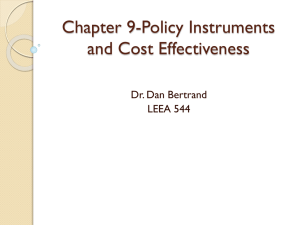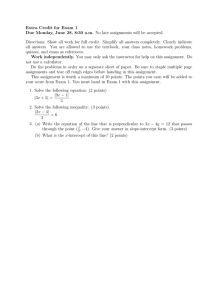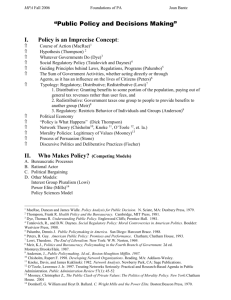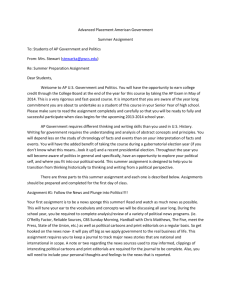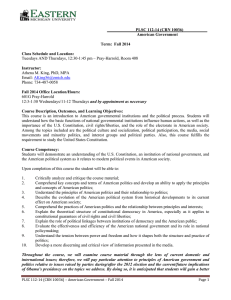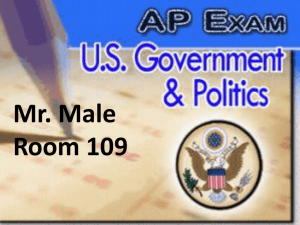PLSC 112-7 (CRN 10027) Athena M. King, PhD, MPA
advertisement
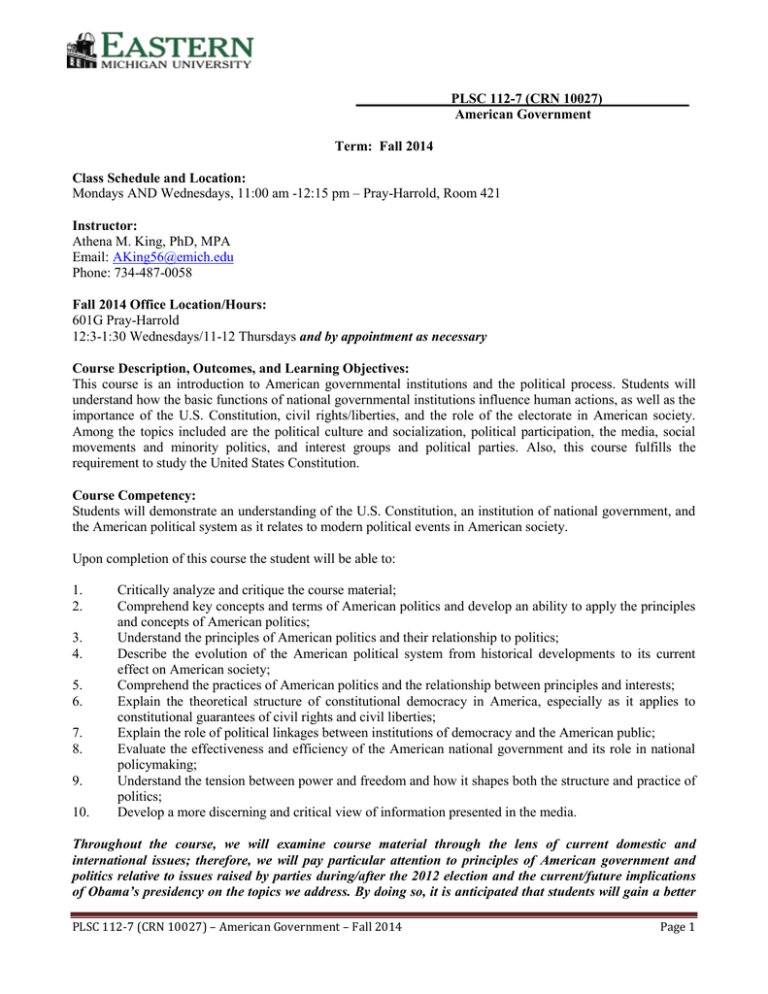
PLSC 112-7 (CRN 10027) American Government Term: Fall 2014 Class Schedule and Location: Mondays AND Wednesdays, 11:00 am -12:15 pm – Pray-Harrold, Room 421 Instructor: Athena M. King, PhD, MPA Email: AKing56@emich.edu Phone: 734-487-0058 Fall 2014 Office Location/Hours: 601G Pray-Harrold 12:3-1:30 Wednesdays/11-12 Thursdays and by appointment as necessary Course Description, Outcomes, and Learning Objectives: This course is an introduction to American governmental institutions and the political process. Students will understand how the basic functions of national governmental institutions influence human actions, as well as the importance of the U.S. Constitution, civil rights/liberties, and the role of the electorate in American society. Among the topics included are the political culture and socialization, political participation, the media, social movements and minority politics, and interest groups and political parties. Also, this course fulfills the requirement to study the United States Constitution. Course Competency: Students will demonstrate an understanding of the U.S. Constitution, an institution of national government, and the American political system as it relates to modern political events in American society. Upon completion of this course the student will be able to: 1. 2. 3. 4. 5. 6. 7. 8. 9. 10. Critically analyze and critique the course material; Comprehend key concepts and terms of American politics and develop an ability to apply the principles and concepts of American politics; Understand the principles of American politics and their relationship to politics; Describe the evolution of the American political system from historical developments to its current effect on American society; Comprehend the practices of American politics and the relationship between principles and interests; Explain the theoretical structure of constitutional democracy in America, especially as it applies to constitutional guarantees of civil rights and civil liberties; Explain the role of political linkages between institutions of democracy and the American public; Evaluate the effectiveness and efficiency of the American national government and its role in national policymaking; Understand the tension between power and freedom and how it shapes both the structure and practice of politics; Develop a more discerning and critical view of information presented in the media. Throughout the course, we will examine course material through the lens of current domestic and international issues; therefore, we will pay particular attention to principles of American government and politics relative to issues raised by parties during/after the 2012 election and the current/future implications of Obama’s presidency on the topics we address. By doing so, it is anticipated that students will gain a better PLSC 112-7 (CRN 10027) – American Government – Fall 2014 Page 1 understanding of the government, its function, and its actors for the purposes of being able to make informed decisions should they choose to become more active members in both the political process and society in general. Textbook(s)/readings/Web assignment link: 1. Lowi, Ginsberg, Shepsle, and Ansolabehere. American Government: Power and Purpose (13th Full Edition); note: US Constitution is in the BACK of the American Government textbook 2. Abramowitz, Alan: The Polarized Public (Pearson) 3. http://wwnorton.com/college/polisci/american-government12/full/ There are two required texts for this course, both available in the EMU bookstore; for your convenience, the Lowi et al. text is also available as an e-book. However, you are free to purchase/rent these books from alternate sources such as Amazon.com, usually at reduced cost. Note: If you choose to utilize an alternate source and you do not receive the materials in a timely manner, you are still responsible for all written assignments, exams, quizzes, and other methods of evaluation for this course. The Lowi et al. text is the backbone to the class!! In it, the key terms and concepts are described, explained, and applied. The text offers the usual narrative that texts provide as well as several asides: debates, short case studies, and short essays. All of these features, along with the usual charts, tables, and figures, are important. Given that 2012 was a presidential election year and we’re in the middle of a second Obama Administration, Lowi et al. text provides an opportunity to examine two questions central to the course, “Where are you in this story, and how does it factor into your decision to begin participating (or further participate) in the political process?” Abramowitz (The Polarized Public) examines the issue of party polarization and how this degree of disparity shapes elections, political outcomes, and general perceptions of socioeconomic/racial/ethnic groups by others. The course is a mixture of (primarily) lecture and discussion. I do not try to cover everything in class. If something confuses you and requires clarification, you must ask questions. I facilitate the process of learning, but the ultimate responsibility for learning – and demonstrating what you’ve learned - lies with you. In addition to the texts, we will study the US Constitution (found in the back of the Lowi et al. text). What is a “constitution”? Officially, it is system for government (usually written) that defines the functioning of a government. Why are they adopted? Generally, to establish a supreme law of the land (whether it is a state, or an entire country). In that context, we will study the two in conjunction with the textbooks so as to provide students with greater understanding of things such as (1) government organization, (2) the granting/separating of powers, and (3) establishment of rights to be enjoyed by citizens of the state and/or nation. The web link (Norton Study Space) will be used to complete quizzes and assignments. You are also expected to use this link as a supplement to the weekly readings. The Study Space site contains chapter outlines, flashcards of key terms, exercises (discussed later in the syllabus), and a news feed regarding the latest in American Politics. Please note that although the link is for the 12th edition of the book (and we’re using the 13th edition in class), the quizzes, assignments, flashcards, etc. are the same for both editions. Course Requirements and Evaluation: Unless otherwise stated, all written assignments (except in-class exams) to be handed in are to be proofread by you for spelling/grammatical errors, typewritten, double-spaced, with 11 or 12-point font, and 1-inch margins; be sure to include your name, course number, and the date submitted. Assignments that do not follow these guidelines, along with late assignments, risk a penalty. Like all courses, this course requires you to conscientiously complete all the assigned readings, the written assignments, and to attend class. (Please note that attendance and participation may make the difference in PLSC 112-7 (CRN 10027) – American Government – Fall 2014 Page 2 your grade, so it behooves you to attend all classes.) However, this course will also require you to participate in class discussions as well as demonstrate your ability to think critically and apply the material to real-world situations. In addition to the formal requirements set below, the class may be given in-class or homework assignments based on class videos or discussions, and video material is often incorporated in the exams. To reiterate, it behooves you to attend all classes, participate in class discussions, and utilize all resources suggested. The formal requirements for this course are as follows: Requirements % of Total Course Credit Online assignments (e.g. quizzes, Analyzing the Evidence, Principles of Politics), COLLECTIVELY 15 Written Assignments (e.g. Essays) 15 First Exam 20 Second Exam – noncumulative 25 Third Exam (Final) – noncumulative 25 TOTAL 100% Grading Scale: All grades in this class will be based upon a 0 to 100 scale, whereas: A = 100 to 94; A- = 93 to 90; B+ = 89 to 86; B = 85 to 83; B- = 82 to 80; C+ = 79 to 76; C = 75 to 73; C- = 72 to 70; D+ = 69 to 66; D = 65 to 63; D- = 62 to 60; F = 59 and below. Class Participation and Attendance: This class combines lecture and discussion; attendance is expected. I expect you to complete the readings for each day and will feel free to call on you. Participation may be factored into your grade along with attendance; therefore, a person who attends all class sessions and contributes regularly to the discussion may receive extra credit, compared to someone with frequent absences and little to no participation. As such, your level of participation and attendance may raise or lower your course grade. Students who contribute to the discussion regularly (i.e. when called upon, or asking questions that are germane to the material and discussion) may receive as much as two extra credit points (added to final grade) for the semester; students who fail to contribute to the discussion (i.e. can’t/won’t answer questions when called upon or ask irrelevant or tangential questions) will receive no extra credit points. Therefore, no matter how you may perform on the written material, your overall grade may be raised based on your attendance and class participation! • • • • Students who are not present when the roll is called or who leave class prior to its dismissal will be considered absent for purposes of determining compliance with the attendance requirements (unless tardiness or early dismissal has been pre-planned and discussed with the instructor in advance). Students adding courses after classes begin are responsible for work covered from the first day of classes. All classes missed are counted as absences. Any student who is absent on the day of a quiz/exam will be assigned a grade of “0” UNLESS PLSC 112-7 (CRN 10027) – American Government – Fall 2014 Page 3 Students with pre-planned absences should inform the instructor in advance of those dates; however, the absences will still count against the student. Make-up exams will be given in accordance with the reason for absence (i.e. you were rushed to the emergency room last night and the dean has contacted me about your situation – make-up will be scheduled; you overslept – no make-up). If you show up late to class on the day of an exam (without a reasonable, valid excuse for tardiness), you can still take it; however, you will only have the remaining time left in the class period to finish. Quizzes: Quiz information will be gleaned from the Lowi, et al. chapters assigned. They will help you test how well you were able to pull out the key ideas and concepts. Take the online quizzes found at this link: http://wwnorton.com/college/polisci/american-government12/full/ (From there, select necessary chapter, then click “Diagnostic/Quiz+ Multiple Choice Quizzes” on the left side). You will do the quizzes for the selected chapters shown on the schedule. The due dates for quizzes are listed on the syllabus, even if the chapter is still being covered in class. You are encouraged to answer at least twenty (20) questions in the section, as many of the exam questions come from the quizzes and there is a correlation between exam performance and the number of quiz questions answered. Should you choose to take a quiz more than once, you are expected to research the correct answer for questions missed using the book, lecture notes and Study Space; constant “guessing until you get it right” is an ineffective study tool. To record the results, fill out the form (using “112-7”, to designate your section from the other two sections I teach) and send the results to your email address and to mine (Aking56@emich.edu). If you mistype my email address, I will not get the results! On the Study Space website you can create a grade book account which will allow you to see if all your quizzes are there. Do not ask me since all I can do is go to the grade book and look. Please be sure to keep the copy of the quiz sent to you; it is your record that you took it. This means creating a folder for them in your email program and setting up a rule to forward the results to it. Feel free to take the assigned quizzes as many times as you like; however, I only want the results sent to me ONCE. So, if you take a quiz three times, send me the score of the third quiz. Essays/Commentary Papers/Research Assignment: From time to time, you will be asked to write a short (less than 4 page) essay or commentary paper and complete a research assignment regarding the presidents in conjunction with particular chapters to be discussed and supplemental information (e.g. videos watched in class or information gathered on your own time). These will allow you to work on critical thinking and writing skills that are part of the General Education program. The essay and research assignment details will be posted online and addressed in class several days prior to the due date. Additional Web Assignments (Analyzing the Evidence, Principles of Politics): This part of the class includes “Analyzing the Evidence” and “Principles of Politics assignments”, found in the same location as the quizzes (http://wwnorton.com/college/polisci/american-government12/full/). You will do them for selected chapters as shown on the schedule; submit them as you do the quizzes. The goal of the Analyzing the Evidence assignment is “to test your critical thinking skills by applying your understanding of the chapter to real political events and situations”. The goal of the Principles of Politics assignments is “to PLSC 112-7 (CRN 10027) – American Government – Fall 2014 Page 4 test your understanding of how the book's five principles of politics apply to real political events and situations”. Assignments will be graded online. Policies: All written work must be completed; late work will be penalized. Make-ups will be given only upon the approval of the instructor. The request must be made in a timely and reasonable manner. All written work is due at the beginning of class and handed in by you. I do not accept emailed work except under extraordinary situations and only after you consult with me. I expect everyone to be on time to class and to complete all business before class so as not to disrupt the class by leaving early or answering phones. That means a) go to the bathroom before class and b) turn off your phones (completely – not just the ringer or putting it on vibrate). If you must leave class early, please tell me before class and sit near the door. I reserve the right to invite you to leave for a day if you miss a large segment of a class or are consistently late. (1) Due dates for assignments are important. Written assignments are due at the beginning of class. After the beginning of class, any written assignment is considered late; online assignments are due before 11:59 pm on its due date. The student will be penalized ½ letter grade for each day (defined as a 24hour period marked from the beginning of class on the assigned due date) that the assignment is not submitted – beginning with a B after the time assignments are requested on the date the paper is due. A student may submit an “F” assignment for possible simple course credit (up to 50% of the assignment’s grade points). You should submit all written assignments directly to the instructor. However, you may put written work in my campus mailbox prior to its due date; written work submitted after the due date and put in my mailbox must be signed and dated by an official representative of the college such as an Administrative Assistant. Do not E-mail written assignments (unless otherwise instructed to do so). (2) All written assignments must be typed or word processed. I will inform you of certain exceptions which may be made during the course of the semester. (3) Instructors are prohibited by federal privacy law from public dissemination of a student’s performance or grades; this includes discussions with other people, E-mail, phone, or any public posting. Therefore, I cannot inform you of your grade in an email or phone call or give that information to another person (e.g., parents) without your permission. (4) E-mail protocol: When you use E-mail to contact an instructor, please follow these guidelines: In the subject heading, please include: E-mail topic, class name, and student’s full name. In the E-mail passage itself: greeting, body of the E-mail, and signature. I will not respond to E-mails sent without this format. I have a 48-hour (maximum) turnaround period for email responses. Weekends, holidays, and college closings do not count in that 48-hour period. Unless otherwise instructed, assignments are not to be Emailed. Also, do not attach files to E-mail correspondence. Disability Statement: Any student eligible for and requesting academic accommodation due to a disability is requested to provide Documentation Confirmation from the Disability Resource Center (in the Student Center) within the first two weeks of class. Please call (734) 487-2470 (Email: DRC@emich.edu) if you have questions or if you need to schedule an appointment. Additional information can be found on the website: http://www.emich.edu/drc/index.php PLSC 112-7 (CRN 10027) – American Government – Fall 2014 Page 5 Course Topic Outline/Course Calendar with Assignments: In order to get the most out of the course, students should read the assigned material prior to the classes for which it is assigned. It is imperative that students do the assigned readings and attend all classes in order to avoid falling behind. Students should be aware that factors beyond our control (e.g. inclement weather, instructor absences) may alter the schedule. Additionally, an interesting discussion in class may prolong certain topics. In any event, we will endeavor to address as many topics shown below (and stay as close to the schedule) as possible. PLEASE NOTE: Should change become necessary, the instructor reserves the right to adjust the requirements, pace, or scheduling of this course. Any change will be announced (in class, posted online or via email) before it becomes effective. Date Reading(s)/Discussion Topic/Activity Assignments Due and Due Dates 9/3/2014 Introductions; syllabus review; (Lowi) Chapter 1 – the Five Principles of Politics 9/8/2014 (Lowi) Chapter 1 – The Five Principles of Politics (cont’d) 9/10/2014 (Lowi) Chapter 2 - Constructing a Government: The Founding and the Constitution 9/15/2014 (Lowi) Chapter 3 – Federalism and the US Constitution, Analyzing the Evidence Amendment 10 Chapter 2 due (online) 9/17/2014 (Lowi) Chapter 4 - Civil Liberties; US Constitution (Amendments 1-9, 13-15, 19, 24, 26); 9/22/2014 (Lowi) Chapter 5 - Civil Rights 9/24/2014 (Lowi) Chapter 6 - Congress: The First Branch; US Constitution (Art. I and Amendments 16, 18, 21, 27) 9/29/2014 (Lowi) Chapter 6 - Congress (Continued) 10/1/2014 Exam #1 (Lowi) Chapter 7 - The Presidency as an Institution; US Constitution (Art. II and Amendments 12, 20, 22, 23, 25) In-Class Video: The Presidents – Carter to George W. Chapter 7 Quiz due (online) Bush; assignment distributed Analyzing the Evidence (Lowi) Chapter 8 - The Executive Branch: Bureaucracy in Chapter 7 (The Presidency) a Democracy; US Constitution (Amendment 10) due (online) Due Date for Written (Lowi) Chapter 9 - The Federal Courts; US Constitution Assignment: the Presidents (Art. III and Amendment 11) (Carter to Obama) (IN CLASS) (Lowi) Chapter 10 – Public Opinion (Lowi) Chapter 11 – Elections Chapter 10 Quiz due (online) (Lowi) Chapter 12 – Political Parties 10/6/2014 10/8/2014 10/13/2014 10/15/2014 10/20/2014 10/22/2014 10/27/2014 PLSC 112-7 (CRN 10027) – American Government – Fall 2014 Chapter 4 Quiz (Civil Liberties) due (online) Principles of Politics Chapter 6 (Congress) due (online) Page 6 10/29/2014 11/3/2014 In-Class Group Discussion: The Polarized Public (Ch. 1-3) In-Class Group Discussion: The Polarized Public (Ch. 4-7) 11/19/2014 Chapter 12 Quiz due (online) Analyzing the Evidence In-Class Video: Boogie Man: The Lee Atwater Story and Chapter 12 (Parties) due discussion; assignment distributed (online) Exam #2 (Chapters 7-12) (Lowi) Chapter 13 – Groups and Interests Due Date for Essay: The In-Class Video: The Best Government Money Can Buy and Polarized Public (IN discussion CLASS) (Lowi) Chapter 14 – The Media 11/24-11/26 Thanksgiving break - no class 12/1/2014 (Lowi) Chapter 15 – Economic Policy 12/3/2014 (Lowi) Chapter 16 – Social Policy 12/8/2014 (Lowi) Chapter 17 – Foreign Policy 12/10/2014 Video: Why We Fight and discussion; wrap up & review 11/5/2014 11/10/2014 11/12/2014 11/17/2014 Principles of Politics Chapter 14 (The Media) due (online) Analyzing the Evidence Chapter 15 (Economic Policy) due (online) Principles of Politics Chapter 16 (Social Policy) due (online) Principles of Politics Chapter 17 (Foreign Policy) due (online) Final Exam (noncumulative): Wednesday, December 17, 2014, 11:00 am-12:30 pm (Schedule set by University. You will be informed in advance of any changes in dates/times.) PLSC 112-7 (CRN 10027) – American Government – Fall 2014 Page 7

